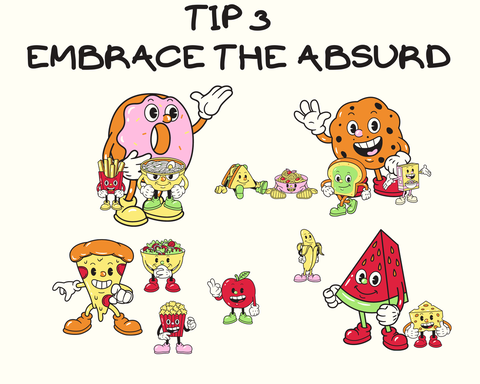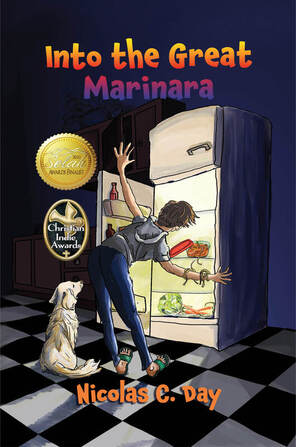|
by Nicolas C. Day Editor's Note--Nicolas C. Day is the author of Into the Great Marinara, which won a Christian Selah Award for middle grade fiction and young adult literature, as well as a Christian Indie Award. As one reviewer wrote--"...super fun and clever story..." I add, "Great Christian message." The links for story "formulas" are books the editor picked on these subjects; others are available as well. You’ve chosen to write Christian fantasy for kids, or you want to help kids and teens write Christian fantasy. Congratulations! You’ve embarked on a noble trail blazed by the footsteps of C. S. Lewis. Though more than worth it, you may find the journey is longer and more winding than expected. A map would help. So, here are five tips I’ve picked up along the way that will help keep you on the path, whether you’re writing or teaching youth about the craft of writing in this genre. TIP 1 Create a Story Arc Certain patterns of storytelling resonate with us. Call it a formula if you will. It’s the reason why some stories stand the test of time for hundreds or thousands of years and others fall by the wayside. Just because you’re writing Christian fiction doesn’t mean you should abandon the universal rules of storytelling. There are a few famous formulas out there– Hero’s Journey, Save the Cat, Three Act Structure, and so on. After you pick one, establish an external AND an internal story arc. The external arc is essentially the plot. This is what happens to the character. Following a proven formula helps structure and pace the plot in a way that keeps readers hooked. Not too fast, not too slow, but right in the Goldilocks sweet zone. While the external arc describes everything that happens to the character, the internal arc describes how the character changes because of those events. It answers a fundamental question: what about the character needed to change? Although we describe stories by the external arc (Hey, did you see that movie about so and so who went to the you know where and then that thing happened…?), it’s the internal arc that makes the story resonate. Putting on my faith hat, I’d say it’s because we’re all designed and hardwired to connect in this way. It’s certainly the way our Author chose to write our story. We were once one way, Christ intervened, now we’re different. See? External and internal arc combined for the win. TIP 2 The World is Your Canvas – Paint it but be Consistent with Your Color Scheme. The last tip was about novel writing. Now let’s focus specifically on the fantasy genre. One super cool feature of fantasy is that you have complete freedom to build a world. You can keep it as close to the real world as you like (low fantasy) or create a completely new realm altogether (high fantasy). The point is, you’re free to make up anything. Anything. So do so! Give us insight into the world you create – history, scenery, rules of physics, politics, whatever it may be. Let us know how your world is different. But remember to be consistent with the rules you created or else you’ll have glaring holes. If gravity is super light, don’t have one of your characters crashing down a hill, unless you can explain your exception (i.e., the character was wearing weighted boots). Be consistent. Unless your point is to be inconsistent. In which case… be consistently inconsistent! In my novel, Into the Great Marinara, my character enters a medieval world of talking pasta dressed in tunics and armor. Except one of my pasta characters wears a tuxedo with a bow tie and a top hat. This makes no sense. You know what else doesn’t make sense? Talking pasta. Which brings me to my next point… TIP 3 Embrace the Absurd Here’s where the fun comes in. Now we’re narrowing our focus from fantasy to youth fantasy. In no other genre is silliness so wildly accepted. The world’s being taken over by pizza eating toasters with fuzzy blue hats? You’re in the right place. Though by no means necessary or a requirement (there are plenty of non-absurd middle-grade fantasy stories), moments of absurdity can be terrific points in your story to communicate a meaningful message. I’m not sure why. Perhaps the uniqueness makes the lessons memorable. Take this excerpt from Lewis Carroll’s Alice in Wonderland-- “‘Would you tell me, please, which way I ought to go from here?' 'That depends a good deal on where you want to get to,' said the Cat. 'I don't much care where,’ said Alice. 'Then it doesn't matter which way you go,' said the Cat. '- so long as I get SOMEWHERE,' Alice added as an explanation. 'Oh, you're sure to do that,' said the Cat, 'if you only walk long enough.’” Alice is talking to a cat. That’s absurd point number one. Absurd point number two is the deliberate misunderstanding of the question by focusing on the literalness of the words. The exchange is light and fun to laugh at, but if you soak long enough, you can find meaningfulness as well. We’re all going somewhere in life, whether we’re trying or not. Maybe it would be a good idea to give some thought to where we’re actually trying to go, and whether our choices help us along that path. Young kids love absurd. I love absurd. If you’re writing youth fantasy, odds are you love absurd. So, dig in, but also look for ways to… TIP 4 Integrate Your Faith…But Remember, You’re Writing a Novel, NOT a Sermon. On our map we’ve traveled through novel world, fantasy country, youth fantasy county, and arrived at Christian youth-fantasy town. It’s time to integrate the themes of the Christian faith. But remember, novels and sermons are different genres. I don’t think I’m on shaky ground here. Jesus used different genres to teach his spiritual truths. Sometimes he spoke in sermons-- “Blessed are the poor in spirit, for theirs is the kingdom of heaven.” (Matthew 5:3) Other times, he spoke in parables--“A man was going down from Jerusalem to Jericho…” (Luke 10:30) You’re in parable land. If you forget this, you’ll usually end up with negative feedback that your story comes across as too “preachy.” People don’t want to turn to a story for a straight sermon. I’ll buck the trend here though. I’d rather err on the side of preachy than water down the message I felt called to write. But I do think there are other ways of effectively communicating the message. For instance, you can embed your faith in the dialogue of a character. Hey, maybe the character is a preacher. Then it’s not you sounding preachy, it’s the character. Or embed faith in the character’s internal story arc. My internal character arc of Into the Great Marinara is a faith journey. Tanner encounters pasta characters who believe the intricacies of their world can only be explained by the presence of a master Chef. Tanner’s journey leads him to the same conclusion. A third tactic--Deliver your message through allegory. This is a readily available option if you’re writing portal fantasy (in which your character is transported to an alternative world). While Chronicles of Narnia isn’t completely allegorical, C. S. Lewis definitely toes the line. Last, but not least… TIP 5 Ask, What’s Driving You to Write Christian Fiction? You can use the talents God has given you to craft an incredible story. You can even touch on themes inherent in the Christian faith such as those in J.R. Tolkien’s Lord of the Rings. For me, apologetics is the driver. It’s not the main theme of my writing. In fact, you may not even notice it’s in there. But I want to be sure that every story I write conveys the message that faith does not require a separation of the mind from the heart, so kids may stand in confidence when intellectual bullies come knocking. This is the motivation I needed to finish writing an entire novel and not just quit after a few chapters as I had done many times before. When writing Christian fiction, the basic tenets of the faith should be there. Fiction writing becomes a type of ministry. Every writer is unique. Every ministry is unique. Prayerfully consider where the two connect for you as a writer. Encourage the kids and teens whom you teach to pray about this too. BONUS TIP Use Age-appropriate Vocabulary I know I said five tips, but I’ll add one bonus tip since it was a valuable lesson for me. Make sure your vocabulary is best suited for the age of your readers. There’s software that can check the approximate reading level of your story and simplify the process for you. (Hemingwayapp.com is an easy one.) As Christians, may you “step into” gifts from God, be creative, and help others to do the same. To Him be the Glory!  About the Author Nicolas C. Day didn't always embrace the Christian faith, but once he did he took his faith to a big, next level and earned a Certificate in Christian Apologetics from the Talbot School of Theology at Biola University. Now he's passionate about helping his young readers know how to defend their Christian beliefs and stand firm in God's truths. He is a family man, has a B.S. degree in petroleum engineering, and enriches his stories with his gifts to create entertaining and inspiring Christian fantasy. You can reach Nicolas C. Day on the web, NicolasCDay.com and on FaceBook at Author Nicolas C. Day. His book, Into the Great Marinara, is available on Amazon and other major retailers. Editor's Note: Would you like to see more posts to help you teach children and teens how to write, that include a Christian perspective? I invite you to sign up here. newSongpress.net
I also invite you to send comments to newSongpress/contact.html or on Facebook at Heidi Vertrees Author/Educator, as well as comment here.
4 Comments
Dina Lioumanis
10/12/2023 02:40:19 pm
Yes please! Helping teens how to write with a Christian perspective.
Reply
Dina
10/13/2023 12:48:32 pm
Oops, hit unsubscribe by accident. Please subscribe me again. Thank you so much!
Reply
11/20/2023 10:01:03 pm
Hi, Dina. We welcome you to subscribe again. The system is not set up for me to know your email address once you have unsubscribed. We are sorry you hit the wrong button and we hope you can continue to enjoy these posts.
Reply
Your comment will be posted after it is approved.
Leave a Reply. |
Archives
November 2023
CategoriesAll Christian Writing Prompts Christian Writing Prompt That Helps Kids See God's Love For Them Christian Writing Workshops Songwriting Prompts Students Writing With Strong Voice Teaching Reluctant Writers Writing-with-strong-voice |
COPYRIGHT 2023, NEWSONG PRESS





 RSS Feed
RSS Feed